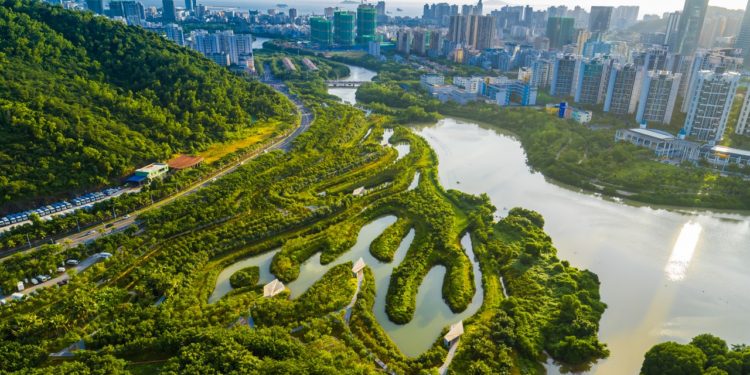By WIRED
Your city isn’t prepared for what’s coming. The classical method for dealing with stormwater is to get it out of town as quickly as possible, with gutters and sewers and canals. But more and more, that strategy is breaking down: As the atmosphere warms, it can hold more moisture, spawning ever-wetter storms that overwhelm this creaky infrastructure. Your city was built for a climate of 100, 200, 300 years ago, but that climate no longer exists.
The hot new strategy in urban design, which was pioneered in China, is to slow everything down. Since 2013, China has embarked on a national policy to turn its growing metropolises into sponge cities, which capture stormwater instead of disposing of it all. If engineers can slow the flow of that water and allow it to soak into the Earth instead of running away—using rain gardens, spreading grounds, permeable pavers, and urban wetlands—that simultaneously reduces flooding and refills underlying aquifers. That’ll be increasingly critical as the planet warms and droughts intensify: Sponge cities aim to bank water for a rainy day, or more accurately, a parched one.
“Whenever rain falls, we retain as much as possible,” says Kongjian Yu, champion of the concept and founder of the Beijing design firm Turenscape. “We slow down the flow and let the earth take in the water. A sponge city will become an adaptive city, a resilient water system, a porous landscape.” A recent study found that, all told, cities across the United States could be soaking up billions of gallons of water a day in part by following China’s lead and accelerating sponge projects. “The sponge city is the urgent, immediate solution that can adapt cities to climate change, to heat, to floods, to drought,” says Yu.
This is what Benjakitti Forest Park, in Bangkok, Thailand, looked like before and after its sponge conversion. (Move the slider to see the full transformation.)
Following Yu’s recent award of the Oberlander Prize by the Cultural Landscape Foundation for his work on sponge cities, WIRED sat down with the landscape architect to talk about how to make urban areas as spongy as possible, how that can solve a whole lot of problems all at once, and what metropolises can do now to prepare for the increasingly chaotic climate of tomorrow. This conversation has been condensed and edited for clarity
WIRED: One thing that makes this concept so powerful is that you can do it on such different scales. In Los Angeles, they have spreading grounds—open areas hundreds of feet across where water is allowed to soak into the aquifer—but they’re also tearing up thin strips of roadside and putting in greenery.
Kongjian Yu: A sponge city can be on any scale. Water is precious. If you retain water in your backyard, you don’t have to water your trees, you don’t have to water your garden, because water is underneath—your treasure is here. It’s at a personal, individual, community scale.







Discussion about this post